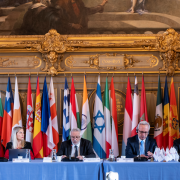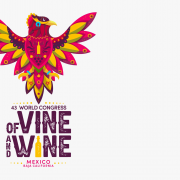
1.Head of Unit: Viticulture
Job Description: Under the supervision of the Director General and the direct authority of the Scientific and Technical Director, to participate in the smooth running of the OIV's scientific activity and mainly to ensure the animation of the Viticulture Commission, the Table Grapes and Raisins Sub-Commission and the dependent groups of experts.
Location: Until 31 July 2022, Paris, FRANCE / from August 2022, Dijon, FRANCE.
Date of entry into service: As soon as possible
How to apply: Fill in the form and send it completed to: job@oiv.int
Deadline for submitting application: 1 April 2022 at noon
2. Head of Unit: Oenology Methods of analysis
Job description: Under the supervision of the Director General and the direct authority of the Scientific and Technical Director, to participate in the smooth running of the OIV's scientific activity and mainly to ensure the animation of the Oenology Commission, the Methods of Analysis Sub-Commission and the dependent groups of experts. provide the secretariat for the Oenology Commission, the Sub-Commission on Methods of Analysis and the dependent expert groups, such as Technology Microbiology and Specifications of oenological products.
Location: Until 31 July 2022, Paris, FRANCE / from August 2022, Dijon, FRANCE.
Date of entry into service: As soon as possible
How to apply: Fill in the form and send it completed to: job@oiv.int
Deadline for submitting application: 1 April 2022 at noon
3.Head of Unit: Safety and Health
Job description: Under the supervision of the Director General and the direct authority of the Scientific and Technical Director, to participate in the smooth running of the OIV's scientific activity and mainly to lead the Safety and Health Commission and the dependent groups of experts. To provide the secretariat for the Safety and Health Commission and related expert groups, such as food safety, consumption, nutrition and health. More information in the FORM.
Location: Until 31 July 2022, Paris, FRANCE / from August 2022, Dijon, FRANCE.
Date of entry into service: As soon as possible
How to apply: Fill in the form and send it completed to: job@oiv.int
Deadline for submitting application: 1 April 2022 at noon
4.Data Manager
Job description: Under the supervision of the Head of the Statistics Department : Prepare and update questionnaires and statistical surveys, Receive, review and input data from Member States and other sources, Conducting online searches and data extractions, Check the completeness, internal consistency and plausibility of the data, Maintain appropriate technical documentation on data series and write methodological notes on OIV statistics, Participate in the maintenance of the statistical database.
Location: Until 31 July 2022, Paris, FRANCE / from August 2022, Dijon, FRANCE.
Date of entry into service: As soon as possible
How to apply: Fill in the form and send it completed to: job@oiv.int
Deadline for submitting application: 1 April 2022 at noon.
2.Secretariat Scientific and Technical Department
Job Description: Under the supervision of the Director General and the direct authority of the Scientific and Technical Director and in coordination with the Heads of Unit, the Secretary of the Scientific and Technical Unit will ensure: management of commission, sub-commissions expert group meetings, delegation requests, convocations, calendars, badges; follow-up on the evolution of draft resolutions and comments, as well as minutes, agenda, formatting ; publication/dissemination of working documents; management of the collaborative work platform; delegation management
Location: Until 31 July 2022, Paris, FRANCE / from August 2022, Dijon, FRANCE.
Date of entry into service: As soon as possible
How to apply: Fill in the form and send it completed to: job@oiv.int
Deadline for submitting application: 1 April 2022 at noon

The 43rd World Congress of Vine and Wine and the 20th General Assembly of the International Organisation of Vine and Wine (OIV) will take place from 31 October to 4 November in Ensenada, Baja California, Mexico, at Baja California Center.
To know more about the Congress and register, please check the Congress Website
Members of the vitivinicultural scientific community are invited to submit an abstract on the OIV platform of abstracts
Important dates:
• Deadline for the submission of abstract: 23rd April 2022
• Information about the decision:26th May 2022• Deadline for the final papers submission: 9th September 2022
Read the call for papers here
Baja California is one of the 14 wine-producer states. It currently contributes 75% of national production.
It geographically adjoins the Pacific Ocean, obtaining its Mediterranean weather, ideal for wine production. The agricultural valleys are located between 20 and 550 meters above sea level; Baja California currently houses 260 vine producers, 170 winemaking projects, which represent 70% county-wide. It is the state with greater grape diversity used for winemaking production-wise and experimental-wise. Our well known Valle de Guadalupe is a wine tourism platform for oenophiles, but also for people that want to introduce themselves in the wine industry.